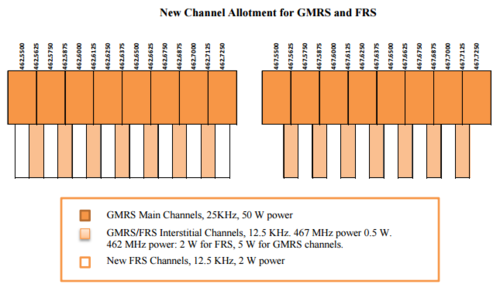In June 2010, the FCC proposed sweeping changes to personal radio services, including the GMRS. WT Docket No. 10-119 included proposals such as lowering power limits of GMRS radios to 2 watts, changing the allowance for GMRS repeaters and, most notably, eliminating the license requirement for GMRS and license by rule. Now, after 7 long years, the FCC has finally moved to consider a ruling on these proposed changes, and more. The ruling didn't limit these changes to the GMRS, but affected FRS, CB, MURS, and other personal radio services. In effect, the FCC isn't merely wanting to change Part 95 rules, they are planning to reform them.
This Report and Order is a major re-write of the Part 95 Rules. It was apparently reorganized to make it more consistent and easier to read, and eliminating "Q&A" style structuring of some rules in the document. According to the FCC, the rules are being overhauled "to modernize them, remove outdated requirements, and reorganize them to make it easier to find information." In re-writing the rules, the commission hopes to make them "consistent, clear and concise".
Whether or not the FCC actually achieves this objective remains to be seen. The new Part 95 is still a long read, and at 114 pages, the full Report and Order, which includes the new Part 95 rules, is even longer. However, the changes are significant. For users of FRS, GMRS, and CB radios, here is a summary of key changes to those services.
Family Radio Service (FRS)
FRS would now have 22 channels. All 22 channels that today's combination FRS/GMRS radios use will become part of FRS. All FRS channels are also allotted to the GMRS channels on a shared basis.
FRS would now have higher wattage. Previously, FRS was limited to one-half of one watt. The new rules allow FRS radios to transmit at up to 2 watts of power. According to the FCC's new rules, "Each FRS transmitter type must be designed such that the effective radiated power (ERP) on channels 8 through 14 does not exceed 0.5 Watts and the ERP on channels 1 through 7 and 15 through 22 does not exceed 2.0 Watts."
FRS radios may transmit digital data Previously, FRS transmissions were limited to voice conversations. Now, these units may also transmit and receive digital data as well. This includes location information or brief text messages to and from other FRS or GMRS stations. The FCC states " Digital data transmissions must be initiated by a manual action of the operator, except that a FRS unit receiving an interrogation request may automatically respond
with its location."
FRS will be allowed to be combined with Part 15 devices. This would permit combination with technologies such as Wi-Fi and Bluetooth.
FRS license by rule is still the rule, but different. Many current combination FRS/GMRS handheld two way radios will be reclassified as FRS and not require an individual license to operate on any of 22 the channels. In effect, if the currently classified FRS/GMRS radio transmits below 2 watts, it's officially an FRS radio and doesn't require a license to operate. Both individuals and businesses now seem to be explicitly authorized for use on the FRS.
General Mobile Radio Service (GMRS)
GMRS would have 30 channels. The GMRS is allotted 30 total channels consisting of 16 main channels and 14 interstitial channels. The GMRS operators may use their GMRS station for two-way plain language voice communications with other GMRS stations and with FRS units for personal or business activities.
GMRS can still be used with repeaters. The rules allow for use of GMRS with repeaters on specified channels. GMRS repeater, base and fixed stations may be operated by remote control.
GMRS radios may transmit digital data. As with FRS, digital location information, requests for location information, and brief text messages to another specific unit are now allowed to be transmitted over GMRS. Previously this was allowed to Garmin through a special waiver.
GMRS still requires a license but for a longer term. Previously, a GMRS license was valid for 5 years. Licenses are now valid for 10 years. As for current FRS/GMRS radios, If it transmits above 2 watts, it's a GMRS radio and needs a license. Current repeater capable FRS/GMRS radios will be classified as GMRS and require a license. A license is still issued for use by individuals and their immediate families. Immediate family members are the licensee's spouse, children, grandchildren, stepchildren, parents, grandparents, stepparents, brothers, sisters, aunts, uncles, nieces, nephews and in-laws. Non-individuals are grandfathered in.
Citizen's Band Radio Service (CBRS)
"Citizens Band Radio Service" would be officially named "CB Radio Service". Cordless microphones are allowed on CB. The restriction of long-range communications for CB has been eliminated, however the power limit was not increased. The CB serial number no longer required to be engraved into the transmitter chassis. Manufacturers are no longer required to include the FCC rules with CB radios.
Other notable changes affecting all of these services
- Voice obscuring features would be prohibited across the entire PRS.
- Continued use of existing radios that include scrambling features are now prohibited.
- 18 months after adoption, no person shall be permitted to manufacture, import, sell, or offer for sale any equipment that incorporates voice scrambling or obscuring for any of the PRS regardless of previous certification.
- Radios combining multiple services will no longer be approved. This includes FRS and GMRS (although GMRS is compatible with FRS).
Note: The reform is under tentative consideration by the FCC at its open meeting scheduled for May 18, 2017. From the FCC: "The issues... and the Commission's ultimate resolution of those issues remain under consideration and subject to change. This document does not constitute any official action by the Commission."
What do you think of the new Part 95 rules? Enter your comments below.







